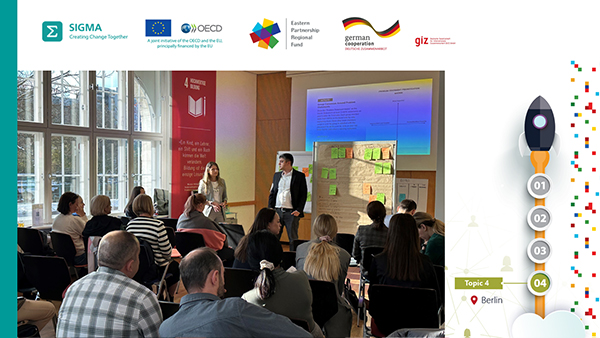Introduction and background
Ultimately, the test of good service delivery is whether it has lived up to the needs and expectations of the customer. This brings us full circle back to the first step – understanding what users want. In terms of service transformation, measuring and managing satisfaction is a key strategic tool: sophisticated approaches to modelling customer satisfaction allow an organisation to identify the ‘drivers’ of satisfaction or dissatisfaction – the factors that determine whether the user is happy or not. While individual services can be assessed at specific points in their life cycle, a more dynamic analytical approach is to evaluate users’ experiences of ‘life events’ – common, crucial moments or stages in the lives of citizens or the lifespan of a business. The ‘life event’ approach is both a tool of analysis, and the basis for organising public services, especially electronic services online that can exploit the processing and networking power of ICT.
|
Days 1 and 2: Measuring and managing insights and feedback from citizens/users
The OECD team started by laying out some of the key concepts needed before trying to gather user feedback. During day 1, participants examined how government agencies view public services, and how their views differ from the perspective of users. The session covered basic good practices in defining individual public services and creating inventories to identify them. Topics covered were service definitions and service catalogues, user charters and life events. This session was followed by an in-depth session examining how data satisfaction, and its drivers, can be gathered in a structured and robust manner from citizens. The session included a deep dive into the concrete aspects of public service delivery which matter to users and help to determine the level of satisfaction they experience. The Germany’s national statistical office presented their survey of life events.
During day 2, the focus was on measuring trust in public institutions. Trust is a critical outcome metric of public governance. Trust reflects citizens' past experiences of the competence and values of public institutions. Topics covered included Why measure trust and drivers of trust in public institutions? The OECD Framework for Drivers of Trust in Public Institutions includes public governance drivers (responsiveness, reliability, openness, integrity, fairness), cultural, economic and political drivers and intergenerational and global challenges.
The first part of the academy concluded with good practices in managing surveys to gather feedback from citizens and users of public services. The session focused on practical issues in survey design and implementation, and tips on how to avoid common mistakes and problems. Topics covered included: selecting an appropriate sample, selecting an appropriate survey mode (online, in-person, etc), survey tool translation and cultural sensitivity, quality controls during data collection, privacy and confidentiality in data use, and other data gathering options: mystery shopping, exit surveys,…
|
Read the presentation
by the Federal Statistical Office of Germany

|
Day 3: E-participation and Country presentations
The first part of day 3 focused on e-participation with Goran Forbici - Director of CNVOS, the Slovenian umbrella of civil society organisations. The use of electronic means is becoming more and more important. Electronic participation refers to the use of ICT in facilitating citizen participation in government-related processes, encompassing areas such as administration, service delivery, decision making, and policymaking. E-participation in EaP countries, the current trends and challenges were presented and discussed with the participants together with key international trends of e-participation (methods, tools, advantages, disadvantages).
During the second part of day 3, the participating countries gave in-depth presentations:
|
Read the presentation by Goran Forbici

|
Days 4 and 5: Product driven, agile, lean and human centered design
During the last 2 days of this immersive experience, Tamara Srzentic shared strategies and methodologies used by her teams in the governments of USA, Canada, Latin America and Europe and how these governments leveraged iterative service design tools and feedback loops to streamline public administration and deliver better services. The training featured digital service, product-driven, agile, lean and human-centered design techniques - created for the private sector and customised for the government workforce – to maximise these teams’ potential and capacity to deliver products and solutions that solve problems. The training examined:
- Creating a truly participatory processes and government - the one that meets people where they are and builds "with" them and not "for" them.
- Iterative service design and delivery practices and playbooks, (leveraging user insights and feedback) to deliver more human-centered products, programmes and services.
- Methods and tools that help us get to the root cause of the challenges as well as leverage feedback to test low fidelity prototypes (with a goal of validating, iterating, and launching effective solutions in months, rather than years).
- Examples and case studies (best practices, models and concepts), capacity building (iterative, service design skills, tools and mindsets) and how to obtain institutional and broader stakeholder buy-in, stand up and drive broader adoption of this practices.
|
Presentation by Tamara Srzentic
(coming soon)
|


.jpg)


